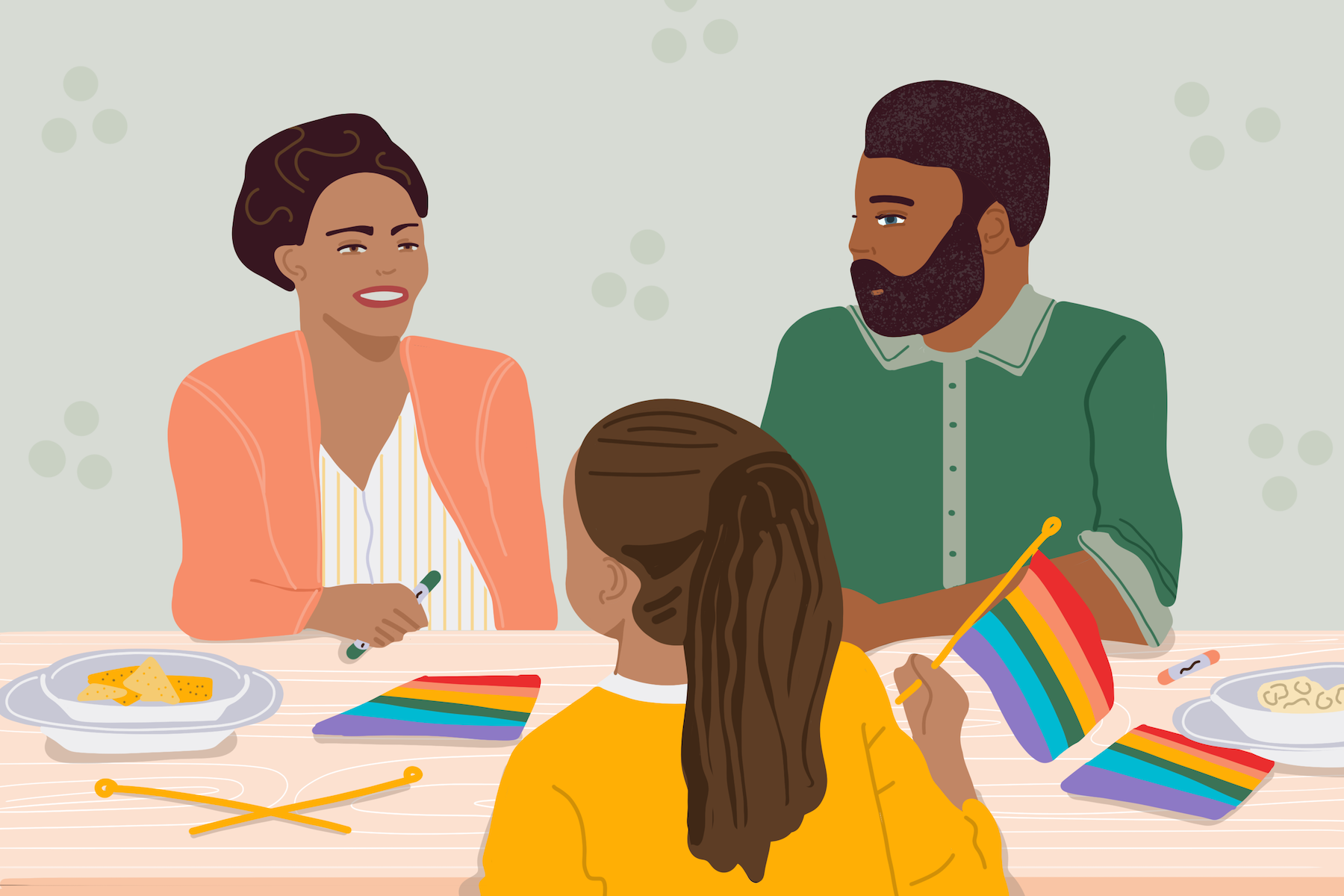
It's hard being a young LGBTQ person. Despite gains we've made in recent years in the court of public opinion and socially, LGBTQ kids still face higher rates of bullying, familial rejection, depression, and suicide than their non-LGBTQ peers.
Add to the equation new bills targeting LGBTQ children, like ones attempting to block access to medical procedures for transgender youth, and the challenges LGBTQ kids face is exponentially compounded.
But despite a political climate that seems to be backsliding when it comes to acceptance and equality, the cultural landscape offers reasons for hope. Media is more representational than ever with shows and movies featuring same-sex families, as well as LGBTQ-inclusive programming for kids as early as preschool (Pose's Billy Porter guest starred on Sesame Street wearing the same dress he donned at the 2019 Academy Awards).
As the parent of a child who identifies as LGBTQ, there are also measures you can take to provide an added layer of support. Experts weigh in on ways parents can help their kids feel empowered even if they hear about or are directly impacted by anti-LGBTQ rhetoric.
Validate Their Feelings
The best thing you can do as a parent is to level with your kid and avoid dismissing or sugar-coating their concerns. Validate what they're feeling and experiencing by listening, accepting, empathizing, and supporting.
"If you have an LGBTQ child, you can make a world of difference by simply acknowledging that you know how bad it is out there, and that they are always safe with you," says Eliza Byard, executive director of Glsen, an LGBTQ education organization. This gives your child the foundation to open up about their feelings, which can lead to safety planning and working together to take action.
With families staying at home more during the pandemic, parents have a unique opportunity to engage their kids in a thoughtful way to learn more about who they are. Approaching that conversation about their sexual or gender identity can be daunting for everyone, though. Family Equality Council, a leading LGBTQ organization that advocates for inclusive family policies and resources, offers some good advice about how to broach the subject. The key is not to ignore the topic or to call them out in a way that would appear reprimanding or exposing.
Ask them if there's anything they want to share with you and let them know that you're there to listen. Tell them you believe in them and will love them no matter what.
"Resilience is grounded in being seen, heard, and loved for who you are. At a terrifying moment like this, parents' unconditional love and support is everything," says Byard.
Express Acceptance
Go one step beyond listening and become your child's biggest advocate and ally. A big way to do this is by using positive language that encourages them to safely, healthfully, and happily be themselves.
"Parents, whether they have an LGBTQ child or not, should be aware that children are listening, which means that parents have the ability to have a positive influence on what LGBTQ youth hear," says Casey Pick, Esq., senior fellow for advocacy and government affairs for The Trevor Project, a suicide prevention and crisis intervention organization for LGBTQ young people.
According to My Kid is Gay, an organization dedicated to helping parents and caregivers who have LGBTQ kids, says there is one question you should always ask to emphasize acceptance: "How can I support you?"
This can make all the difference as research from The Trevor Project found LGBTQ youth who have at least one accepting adult in their life were 40 percent less likely to report a suicide attempt in 2019.
Help Them Feel Secure
"In order to combat feelings of comparison, you also want to encourage positive identity," says Candice Lapin, parenting expert and author of Parenting in the Age of Perfection: A Modern Guide to Nurturing a Success Mindset.
To do this, amplify positive influences and support mechanisms they have and decrease negativity. Remember, this begins at home. Lapin recommends setting ground rules for behavior at home, ensuring other siblings don't put down their LGBTQ sibling. It's also helpful to encourage kids to call out the things they are most proud of about themselves.
Make resources available for your kids, including more literature, shows, or videos that echo your family's values of acceptance and self-love, offers Lapin. Social media like Tumblr, Facebook groups, or YouTube are good resources to find tweens and teens that are like-minded, adds Lapin. The positive exposure will help reinforce affirmative language and self-love.
And then make sure to surround yourself, your child, and your whole family with supportive and LGBTQ-affirming people and avoid those who aren't inclusive.
With any hope, more of these anti-LGBTQ bills aimed at our children will wither on the vine, and we will focus our energy on moving forward together, a chorus of different colors and creeds and identities, in all of our beautiful diversity. In the meantime, parents, allies, and LGBTQ adults, can help make a difference in the lives of LGBTQ youth.
